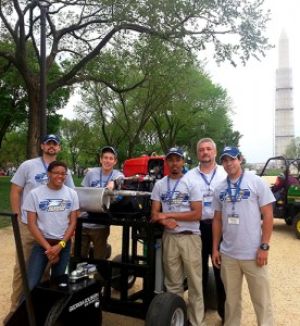Engineering eagles win in D.C.
May 29, 2013
Mechanical engineering students tied with Johns Hopkins University to bring home top honors at the Environmental Protection Agency’s National Sustainable Design Expo last month.
The ninth annual National P3 (People, Prosperity and the Planet) Student Design Competition for Sustainability in Washington, D.C. was hosted at the National Mall.
The GSU team beat out top-tier research universities including Cornell University, Perdue University and Loyola University to tie for first place with Johns Hopkins University and win the American Institute of Chemical Engineers/Youth Council on Sustainable Science and Technology award.
Receiving top honors is a good validation of the work the mechanical engineering department is doing and what it can continue to do, Dr. Brian Vlcek, department chair and professor of mechanical engineering, said.
After three years of work, mechanical engineering students, under the supervision of Dr. Valentin Soloiu, distinguished chair and associate professor of mechanical engineering, produced a diesel engine that runs on two fuels: cottonseed biodiesel and butane oil, both of which can be produced by waste.
“We needed to combine with a new, advanced concept to develop a new technology named ‘low-temperature combustion,’” Soloiu said.
“For me, the idea of reducing emissions in engines was an opportunity to develop technologies that can be applied in other countries,” Alejandro Rivero-Castillo, Master of Science in applied engineering candidate and team member, said.
In the first stage of competition, the team won $15,000 from the EPA to conduct further research on the project in the Renewable Energy and Engines Lab at GSU.
“This brings a new dimension to students and their research,” Soloiu said.
The engine, weighing close to 1,000 pounds, was on display for government officials, other research institutions and tourists to see.
Many of the people that visited the display were amazed by the equipment and technology applied to the engine, Rivero-Castillo said.
The team achieved more than a 50 percent reduction in emissions with its project “Low Temperature Combustion with Reduced PM and NOx Emissions, achieved by n-Butanol in-Port Injected in an Omnivorous Diesel Engine.”
“This project shows what the students and faculty are capable of and proves to other organizations that we are capable of doing work of this caliber,” Vlcek said.
The project will give momentum to the undergraduate research in the mechanical engineering department, Soloiu said.
“This was a better way to see new technology and interact with others in the same field,” Henry Ochieng, master of science in applied engineering candidate and team member, said. “This will definitely get our name out there and let other schools know we are a force to be reckoned with.”






